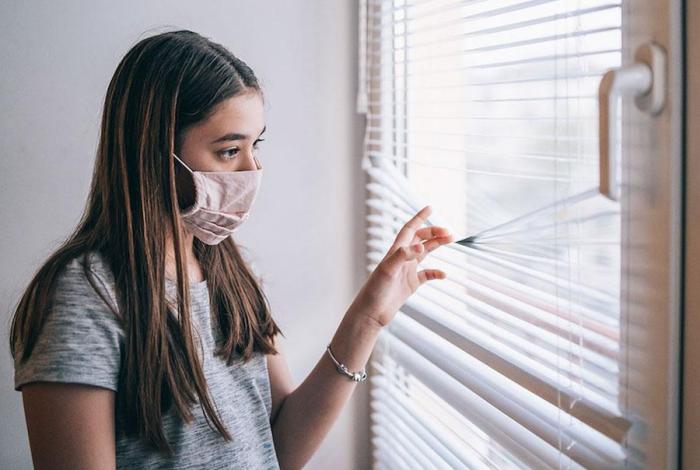Teens in Ladera
Health is at the forefront of discussion – from physical to mental health. During these times, it’s important to be mindful of our mental state, as well as those around us. Although staying positive can be difficult, we can feel empowered by shifting our focus on the things that are within our control.
Article by Emma Megerian
Health is at the forefront of discussion – from physical to mental health. During these times of social distancing, it’s important to be mindful of our mental state, as well as those around us. Although staying positive can be difficult with so much that is out of our control over, we can feel empowered by shifting our focus on the things that are within our control that allow us to stay in a healthy mindset.
 Recently, I had the opportunity to speak with Dr. Sharonne Herbert, Director of Mental Health Emergency Services (MHES) at Children’s Hospital of Orange County (CHOC) to discuss ways that young people can deal with mental health challenges we may be facing during the unprecedented circumstances in which we find ourselves.
Recently, I had the opportunity to speak with Dr. Sharonne Herbert, Director of Mental Health Emergency Services (MHES) at Children’s Hospital of Orange County (CHOC) to discuss ways that young people can deal with mental health challenges we may be facing during the unprecedented circumstances in which we find ourselves.
The first step to taking charge of your psychological wellbeing is recognizing what you are struggling with. Some common things you may be experiencing include feelings of hopelessness, sadness, anxiousness, lack of motivation, loss of interest in things you used to enjoy, and changes in eating habits. These issues may be temporary and will go away after a while. Or, they might persist and require help from a professional. It is important to know at what point you should take further action.
Dr. Herbert advises, “We recommend that teens come in when it seems like their depression, anxiety, hopelessness, or their lack of motivation is impacting their dayto-day [life]. There are times when we aren’t feeling our best – and we overcome them. So, when something persists over an extended period of time and there’s significant impact on our lives, that is when we should say, ‘Perhaps I need some professional assistance.’”
Let’s look at the things you can do on your own to make the most of coping skills.
Pay Attention to the Little Things
When we experience periods of depression, we often overlook the little things such as eating and hygiene simply because we lack the motivation to do them. Such tasks seem arbitrary and useless when we feel persistently miserable. This neglect leads us to sitting around all day enveloped in our own hopelessness. However, taking control and forcing yourself to do the little things, one at a time, it paves the road to having a healthy and productive routine.
Write a list of little things you want to accomplish for each day. By giving us safety and stability, a set routine promotes positive mental and physical health. “It’s so good to have predictability,” Dr. Herbert explains. “If we’re taking care of ourselves by focusing on having a schedule, we maintain structure and predictability. And that will lead to better self-care practices.” That routine should also include a healthy sleep schedule. The amount of sleep we receive has a massive impact on our mood and how well we function. The American Academy of Sleep Medicine recommends that teens should get between eight to ten hours of sleep per night; a standard which most high school students statistically do not meet. Furthermore, proper sleep hygiene means going to bed and waking up at reasonable, consistent times.
Create your daily schedule with realistic expectations for yourself. Start small with the basics – showering, getting dressed, and grooming yourself. Then, stick to your schedule. As you take the smallest of steps in the right direction – you’re making progress.
The best way to get back into the habit of simple hygiene practices is to treat them as responsibilities. View taking care of yourself the same way you view something like school: as an obligation. In a way, you do have a responsibility to take care of yourself. After a while, the natural motivation to do the things that make you feel good will extend past the basics of washing your face and eating breakfast. Setting a positive, productive foundation for your day makes all the difference.
Talk to Someone
Sometimes, simply having a conversation about your feelings with a person whom you trust can be incredibly helpful. The validation of hearing that someone else understands or feels the same way has the power to alleviate discouragement.
Many people may think that they don’t have anybody to confide in. It’s important to find someone – whether it’s a friend, a parent, a teacher, a cousin, etc. No matter whom you’re talking to, conversations about mental health are not easy to have. Dr. Herbert says, “Sometimes, the first conversation doesn’t go as well as we want it to. There’s no perfect way [to open up about your mental health]… and we should be okay with the fact that we’re probably going to be uncomfortable because we’ve never done it before.” In all areas of life, you have to do something multiple times before it is no longer intimidating. The more we do it, the less uncomfortable it will be. The same goes for talking about our emotional wellbeing. It may be an awkward process of just figuring things out as you go, and that’s okay!
Create Conversations and Connections
Having an environment where discussions on mental health are normal is important, especially in groups of people. Casual mentions of mental health struggles are becoming more and more common. Even someone making a passing comment about being in therapy can encourage others around them to open up. If you have this sort of dynamic in your group of friends, take advantage of that.
When somebody brings up their mental health, tell them you appreciate them being vulnerable and able to share personal things, no matter how small. You could even be the one to integrate dialogue about emotional wellbeing into your group!
“You don’t know how your vocalizations, what you say, are going to be meaningful to other people. It’s an amazing door that gets opened,” Dr. Herbert points out. Bringing up mental health in discussions can be done just like discussions about any other topic. A great way to get the ball rolling is to make references and connections between things in media (books, TV shows, music, etc.) to things happening around the world. “[Your generation] knows what’s going on in the world way before anyone else does. With that being said, it’s usually about people.
So how do we talk about mental health topics related to people we’re aware of in our common culture?” Dr. Herbert suggests you can say to your friends, ‘Hey, I recently watched (movie) and they talked a lot about (topic). I want to hear what you guys think.’ From there will come the natural ebb and flow of discussion where everyone shares their thoughts on a topic, relating it to themselves and their own experiences. Cultivating an atmosphere where people can safely discuss their feelings without scrutiny is beneficial to everyone.
Stay Positive
Currently, the majority of those depressive feelings mentioned earlier come from the fact that COVID-19 prevents us from having in-person social interaction. Seeing your classmates on Zoom is incomparable to the interactive in-class dynamic. The world is shut down, so the options for things to do are extremely limited. All of these factors contribute to widespread problems of anxiety and depression.
If you’re having a hard time staying positive, don’t worry: you’re not alone. It’s obvious when you talk with people, especially your friends, about what you’ve been going through. “The first thing I’ll say is to just share your feelings,” Dr. Herbert emphasizes. “Sometimes, it’s really hard to tell people, ‘I’m struggling. I miss connections.’ Talk about those thoughts whether they’re scary, or not even. Maybe you’re just frustrated or disappointed.”
You’re Not Alone
Dr. Herbert also highlights the significance of finding creative ways to see your friends. It can be hard because when you feel depressed and alone, you find it a lot easier to just not do anything at all. Ironically, refusing socialization (of any kind, regardless of whom it is with) only deepens your sadness. Dr. Herbert makes a point of this. “Instead of going in your room, just hang out in the family space. Even if you don’t want to, just do it!” This also applies to making plans with you friends. While hanging out on FaceTime is not the same as doing so in person, engaging in any kind of social interaction prevents feeling isolated and dejected. Dr. Herbert uses this approach in her own personal life. “New Year’s just passed, and I ended up just playing games … with my friends over Zoom. It was really enjoyable. Not the same, clearly, but it was the best thing I could come up with that was safe and allowed me to be with the people I’m normally with during the holidays.”
There are also things that you can personally do on your own to stay in a good headspace. Taking on individual activities that make you feel proud is a fantastic way to keep yourself happy. When we work towards something, whether it be mastering a new skill or doing a project, we feel a sense of purpose. Seeking to achieve that goal can provide us with the motivation and determination that we were previously lacking. Dr. Herbert provided examples such as learning a new song on an instrument, drawing or painting, working on a puzzle, or practicing a sport. “Try to take something on where you can build in a sense of mastery and [especially] a sense of pride.”

Resources (CHOC)
Mental Health Toolkit
Anxiety: Tips for kids and teens
Depression: What you should know (you’re not alone)
Suicide Prevention: Insights, how we get help and help others
“If we’re taking care of ourselves by focusing on having a schedule, we maintain structure and predictability. And that will lead to better self-care practices.”- Dr. Sharonne Herbert












